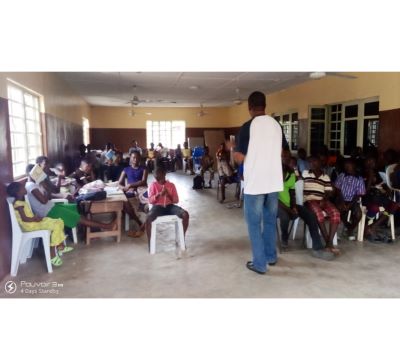Regina Pasipanodya
Growing up in Epworth, Rumbidzai Nyakudanga’s day starts at 5 am when she has to do the household chores and attend to her children, who are now in secondary level, before they leave for school.
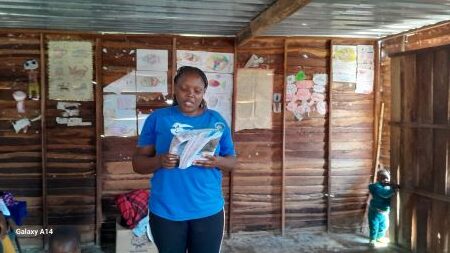
Rumbidzai Nyakudanga
She now has other responsibilities that starts at 7 am in the morning at Epworth, one of Zimbabwe’s peri-urban communities about 18 kilometres southeast of Harare, an area that grew without proper planning now faced with extreme poverty with most of the children out of school.
New teacher in the area
With her qualification in Early Child Development (ECD), Nyakudanga has taken it upon herself a role to provide hope and education to children who were once left without access to conventional schooling.
“Most of my pupils were left alone in the streets by their parents who spent their day peddling for a livelihood,” said Nyakudanga who is offering children between three and 13 years a chance to break free from the cycle of poverty and find a brighter future at her two-block school building.
“I introduced ‘Two Roses Learning Centre’ in 2016 after I realised that most young children in my community spent of their day on the streets without any supervision or anyone to take care of them.
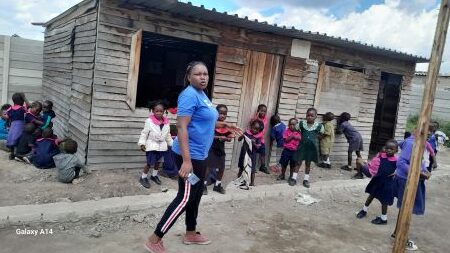
“With this initiative I intend to take children off the streets and provide them with a safe place to grow whilst learning how to read and write. I always say that being intelligent but can’t read and write is worse than being dumb but able to read,” she told she Corresponds Africa.
“Most of my pupils are orphans, single mothers’ children and those also have dreams to become professionals. What made me to start this school is that I feel pity, I just thought I should do something to help these kids so that they can be something or someone in their lives and we rely on well-wishers who sometimes donate books and other stationeries,” Nyakudanga stated.
Beacon of light
The school is a beacon of light to the young ones who openly shares their dreams.
“When I grow up I want to be teacher,” said seven-year-old Theresa Moyo* whose dreams are being shaped at New Roses Learning Centre.
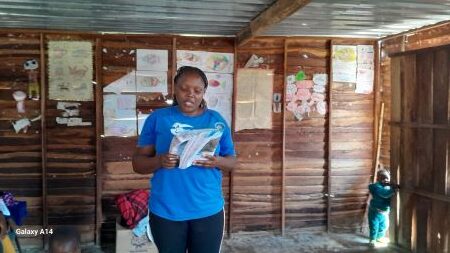
Just like other children, the young girl dreams to become someone when she grows up despite the misfortunes that she is facing as a child.
Moyo is one of the young people in Zimbabwe who are out of school due to economic hardships as her only parent, her mother is struggling as a vendor to put food on the table.
Her mother, Constance Moyo* (27) said she was surprised last year when she came back and learnt that her daughter had joined New Roses Learning Centre.
“I had no hope of sending my child to school one day since I can’t afford. What I would only worry about was her day’s meal and had accepted that education is luxury. But Nyakudanga managed to put a smile on my daughter’s face as she can now attend school, play with others, sing and most importantly learning how to read and write,” said Moyo.
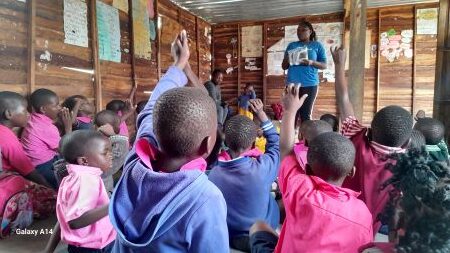
Class in session
Hope for access to primary school education is fast diminishing for many children in Epworth as education has ceased to be a right but is now a privilege.
Hope for access to primary school education is fast diminishing for many children in Epworth as education has ceased to be a right but is now a privilege.
Half a million children out of school
During the International Day of Education commemoration, UNICEF confirmed that around 500 000 Zimbabwean children of school age are not currently attending classes. Only six out of 10 aged three to five are enrolled in pre-primary education. An estimated half a million children of primary and lower secondary school age are out of school reported UNICEF.
In 2024, Primary and Secondary Education Minister Torerai Moyo revealed that Zimbabwe needs at least 2,800 new schools to absorb out-of- school children.
In the budget which was presented by the Finance and Economic Development Minister, Professor Mthuli Ncube, the government pledged to support the Ministry of Primary and Secondary Education in raising additional resources from third parties for infrastructure development.
Zimbabwe Teachers Association Secretary-general Goodwill Taderera recently said that the country’s poor education was a result of the economic crisis.
“We are facing a lot of challenges as we speak and we don’t have adequate schools while the government would like to cater for the highly marginalised particularly through the Basic Education Assistance Module (BEAM) fund. It has not been able to pay BEAM for quite some time throughout 2023 and up to now,” he said
Primary and Secondary Education Ministry Director Taungana Ndoro emphasised the importance of collaboration for better learning outcomes for every child.
However, ZimRights (Zimbabwe Human Rights Associations) revealed that Zimbabwe’s set to miss the Sustainable Development Goals target 4.1 which seeks to ensure that, by 2030, all girls and boys complete free, equitable, and quality primary and secondary education.


